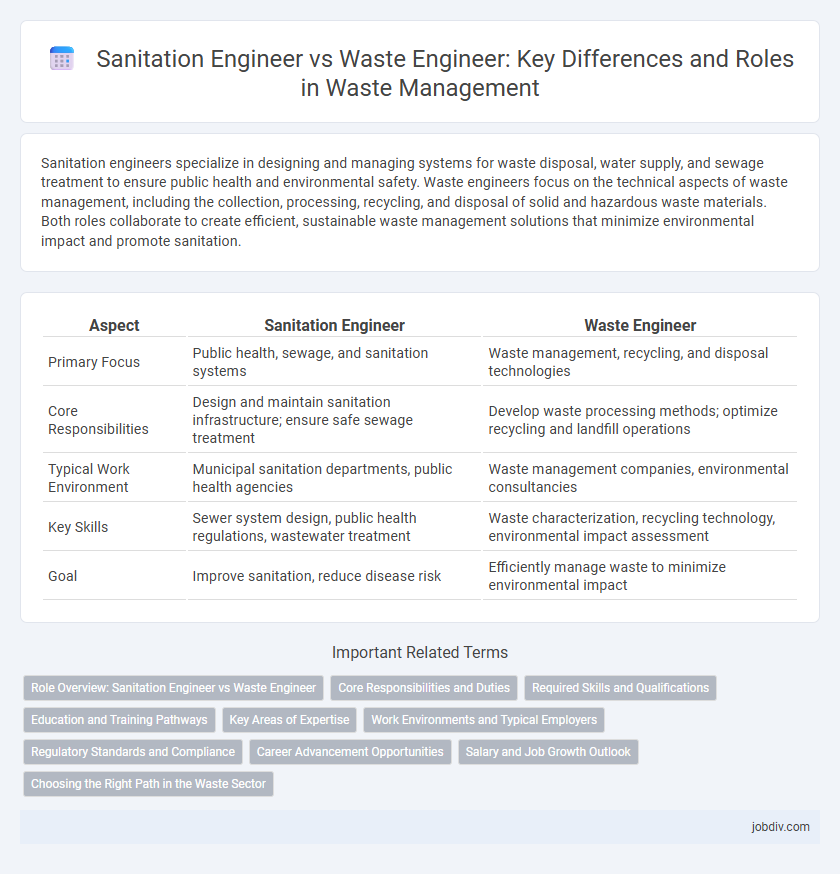Sanitation engineers specialize in designing and managing systems for waste disposal, water supply, and sewage treatment to ensure public health and environmental safety. Waste engineers focus on the technical aspects of waste management, including the collection, processing, recycling, and disposal of solid and hazardous waste materials. Both roles collaborate to create efficient, sustainable waste management solutions that minimize environmental impact and promote sanitation.
Table of Comparison
| Aspect | Sanitation Engineer | Waste Engineer |
|---|---|---|
| Primary Focus | Public health, sewage, and sanitation systems | Waste management, recycling, and disposal technologies |
| Core Responsibilities | Design and maintain sanitation infrastructure; ensure safe sewage treatment | Develop waste processing methods; optimize recycling and landfill operations |
| Typical Work Environment | Municipal sanitation departments, public health agencies | Waste management companies, environmental consultancies |
| Key Skills | Sewer system design, public health regulations, wastewater treatment | Waste characterization, recycling technology, environmental impact assessment |
| Goal | Improve sanitation, reduce disease risk | Efficiently manage waste to minimize environmental impact |
Role Overview: Sanitation Engineer vs Waste Engineer
Sanitation engineers focus on designing and managing systems that ensure public health through effective waste disposal, water treatment, and environmental sanitation. Waste engineers specialize in developing and implementing technologies for solid and hazardous waste management, emphasizing recycling, waste reduction, and sustainable resource recovery. Both roles require expertise in environmental regulations and aim to minimize environmental impact, but sanitation engineers prioritize public health infrastructure while waste engineers concentrate on waste lifecycle management.
Core Responsibilities and Duties
Sanitation engineers primarily focus on designing and implementing systems for waste disposal, sewage management, and public health protection to ensure sanitary conditions in urban and rural environments. Waste engineers specialize in the management of solid waste, including collection, processing, recycling, and disposal, aiming to minimize environmental impact and promote sustainable waste practices. Both roles collaborate to develop efficient waste treatment technologies, but sanitation engineers emphasize public health infrastructure while waste engineers concentrate on material recovery and pollution reduction.
Required Skills and Qualifications
Sanitation Engineers require expertise in public health, environmental regulations, and waste treatment technologies, along with skills in system design and maintenance of sanitation infrastructure. Waste Engineers focus on solid and hazardous waste management, requiring knowledge of waste collection, recycling processes, landfill design, and compliance with environmental standards. Both roles demand strong analytical skills, proficiency in environmental software, and a background in engineering or environmental science.
Education and Training Pathways
Sanitation Engineers typically pursue degrees in environmental engineering or public health, focusing on waste management systems, water treatment, and sanitation infrastructure, often requiring certifications in environmental regulations. Waste Engineers usually have specialized training in waste reduction technologies, recycling processes, and hazardous waste management, with academic backgrounds in chemical or civil engineering supplemented by industry-specific certifications. Both professions emphasize hands-on experience through internships or co-op programs to develop practical skills in designing and managing waste and sanitation solutions.
Key Areas of Expertise
Sanitation engineers specialize in designing and managing systems for waste disposal, water purification, and public health protection, ensuring sanitary conditions in urban and rural environments. Waste engineers focus on the treatment, recycling, and sustainable management of solid and hazardous waste, aiming to minimize environmental impact through innovative technologies. Both professions require expertise in environmental regulations, waste management protocols, and engineering principles, but sanitation engineers emphasize public health infrastructure while waste engineers concentrate on resource recovery and pollution control.
Work Environments and Typical Employers
Sanitation engineers primarily work in municipal agencies, water treatment facilities, and environmental consulting firms, focusing on waste management systems, water purification, and public health infrastructure. Waste engineers are commonly employed by recycling companies, hazardous waste management firms, industrial plants, and government environmental departments, specializing in the design and optimization of waste disposal, recycling processes, and contamination control. Both professions operate in laboratories, field sites, and regulatory bodies but differ in workplace emphasis based on the type of waste handled and regulatory compliance requirements.
Regulatory Standards and Compliance
Sanitation engineers specialize in designing systems that manage wastewater and sewage treatment, ensuring compliance with environmental regulations such as the Clean Water Act and local health codes. Waste engineers focus on the handling, processing, and disposal of solid waste, adhering to regulatory standards like the Resource Conservation and Recovery Act (RCRA) and landfill operation permits. Both professions require rigorous knowledge of regulatory frameworks to implement sustainable waste management solutions and maintain public health safety.
Career Advancement Opportunities
Sanitation engineers primarily focus on designing and maintaining systems for waste disposal and public health improvement, offering career advancement opportunities in municipal planning and environmental health sectors. Waste engineers specialize in waste management technologies, recycling processes, and sustainability solutions, with growth potential in industrial operations and environmental consultancy. Both career paths provide advancing roles through expertise in regulatory compliance, innovative waste treatment methods, and leadership in project management.
Salary and Job Growth Outlook
Sanitation engineers typically earn a median salary of $70,000 annually, with a projected job growth rate of 8% over the next decade due to increasing urban sanitation demands. Waste engineers command a higher average salary around $85,000 and benefit from a faster job growth rate estimated at 12%, driven by advancements in waste management technology and environmental regulations. Both careers contribute significantly to sustainable waste management, but waste engineering offers stronger financial incentives and expanded job opportunities.
Choosing the Right Path in the Waste Sector
Sanitation engineers specialize in designing systems that manage and treat wastewater, ensuring public health and environmental safety, while waste engineers focus on the collection, processing, and disposal of solid waste materials. Choosing the right path depends on your interest in either water-related sanitation solutions or solid waste management technologies, as both roles require expertise in environmental regulations and sustainability practices. A career in sanitation engineering often involves collaboration with public health officials, whereas waste engineering emphasizes innovation in recycling, landfill management, and waste-to-energy processes.
Sanitation Engineer vs Waste Engineer Infographic

 jobdiv.com
jobdiv.com